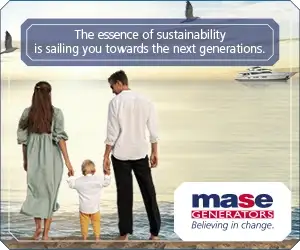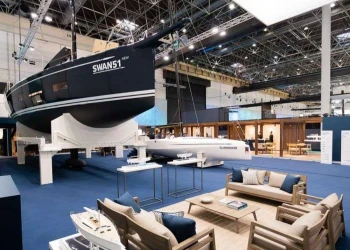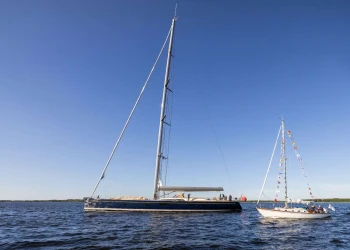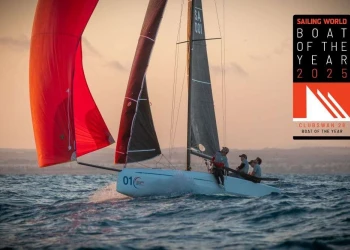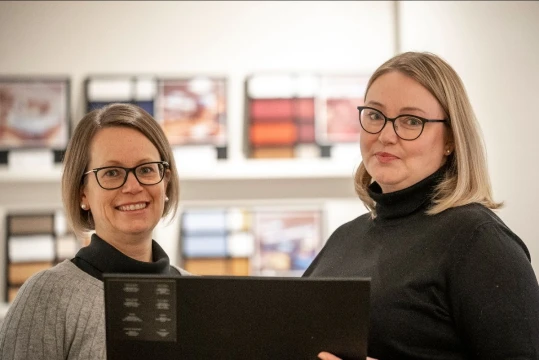
Tina Wik and Heini Gustafsson
Swan: in conversation with Tina Wik and Heini Gustafsson
Tina Wik and Heini Gustafsson, Nautor interior designers, have the important and delicate task to create the perfect interiors in Swan yachts from 48 to 128 feet, meeting the customers' needs, their tastes and with their magical touch they are able to create always something elegant and unique.
Tina: What are the key ingredients that an interior designer needs to think of when designing a sailing yacht?
Positive, committed, detail-oriented, flexible and skilled - these are some of the ingredients that an interior designer at Nautor Swan should have. The designer needs to take into account the given design guidelines from our art director Misa Poggi, consider various safety requirements, ergonomics, follow the given classification rules and most importantly to fulfill the customer's dreams and wishes. The interior needs to hide technical installations while those of course need to still be easily accessible when needed. You always need to be up-to-date with what is happening with different trends while it is very important that you do not forget the Nautor DNA that we have held on to tightly over the years.
Heini: When you receive a brief from an owner, how do you proceed with the study of proposing him/her the best solutions?
If the brief is related to layout and functions, we obviously cross check with the yacht construction platform where the proximity to production and working very closely with the engineering team is key. Yachts being very complex in design, even a small change in the defined layout may have knock-on effects for the rest of the yacht. True to our Nordic origins, we keep an open dialogue with customers in finding the perfect solution together. With over 20 years in yacht design each, both Tina and I have acquired a library of know-how, solutions and tricks of the trade, to solve often re-occurring requests. 'Team Interior' is composed of many fields of expertise, I bring the quick conceptual sketches and studies on tracing paper to the table and other team members work with 3D software. On the other hand, if the brief is more of a decorative and material-based nature, we have a much larger playground. We interact daily with Architect Misa Poggi, who has a broad experience of soft furnishings and is curating our Swan Mood material collections. Part of the Swan Experience is coming to the yard and spending a day with designers in the showroom. This is where we play with Moodboards; samples of woods, fabrics, leathers and fittings together to fit the brief of your perfect yacht interior.
Tina and Heini: A short written reasoning about the art of catching the customer's needs in the briefing process, taking into consideration the inescapable elements at the base of the interior design.
Each project, regardless of the size of yacht, begins with listening to the customer. Quite often, we hear touching stories that go back to the previous generation of Swans, life onboard, and the desire to one day build their own Swan. Over the years, you become sensitive to picking up the nuances and wishes of customers from the briefs. The wishes are not always easy to put into words, and that is where we follow up with questions. It is equally important to understand what customers like as to know the things that they might dislike.
Tina: To make an object unique, in this case a yacht, you also need a great ability to interpret the wishes and the passions of customers. Can we therefore speak of art linked to technique and taste, as well as psychology and sensitivity?
All Swan yachts are unique artworks that reflect the dreams and passions of their owners. Customers' wishes vary a lot and may not always be so easy to understand. This gives us as designers challenges that we love to tackle and find solutions to. Some clients may have fallen in love with a sofa design or the exterior of a house, while others may emphasize great importance to the technical installations on board. All these wishes and dreams will then be translated into a 'Nautorized' interior. There are also fully customized projects such as the Swan 120-001 which was a very large and unique project where the client had very detailed wishes that ran like a red thread throughout the yacht.
Heini: How much does the choice of material weigh? In a world moving more and more towards sustainability, how does this affect the choices of materials?
Yacht interiors very much being designed around the human scale, the personal interactions with the materials become inevitable. The flow between the spaces, both physical and visual, are important in defining the ambience. Whereas Swan yachts are known for using real wood veneer for the feel and look of it, the material palette is edited to reflect the consensus of sustainable values by removing precious woods. We offer various wood treatments on oak, ranging from light to dark instead of importing exotic woods. Characteristics of woods that may have been considered flaws before, are now embraced and seen as beauty marks of a natural material. This way, we can control the waste from the veneer selection process. Our focus points are not always visible to the eye, we use for example PET foam partially made from recycled bottles for the construction of sandwich elements in joinery.
Tina and Heini: What do you consider when choosing the fabrics, leathers and veneer to propose?
Yachting environments are extreme; UV exposure, humidity and saltwater, sunscreen and spills, and the materials choices need to comply with that. The "Owner-Driver" segment yachts are quite often driven by values such as durability, easy-care and maintenance ability. For this, we have beautiful performance fabrics in our collections with a lovely touch!
Soft furnishings are a highly personal preference, and therefore we offer also natural materials such as cottons and luxury linen for soft furnishings. Same for leathers, a coated leather has its advantages in performance, but a natural grain naked leather with a silky soft touch is unrivalled.
Tina and Heini: How do you think the lifestyle has changed onboard? And what do you think will be the trends for the future?
The impact of the global pandemic made cocooning even more important. Yachts are self-contained worlds and apart from being pleasure crafts they may also be considered home offices. We hear this from many customers and work in finding flexible solutions to allow for a full lifestyle solution of combining work and pleasure onboard.

